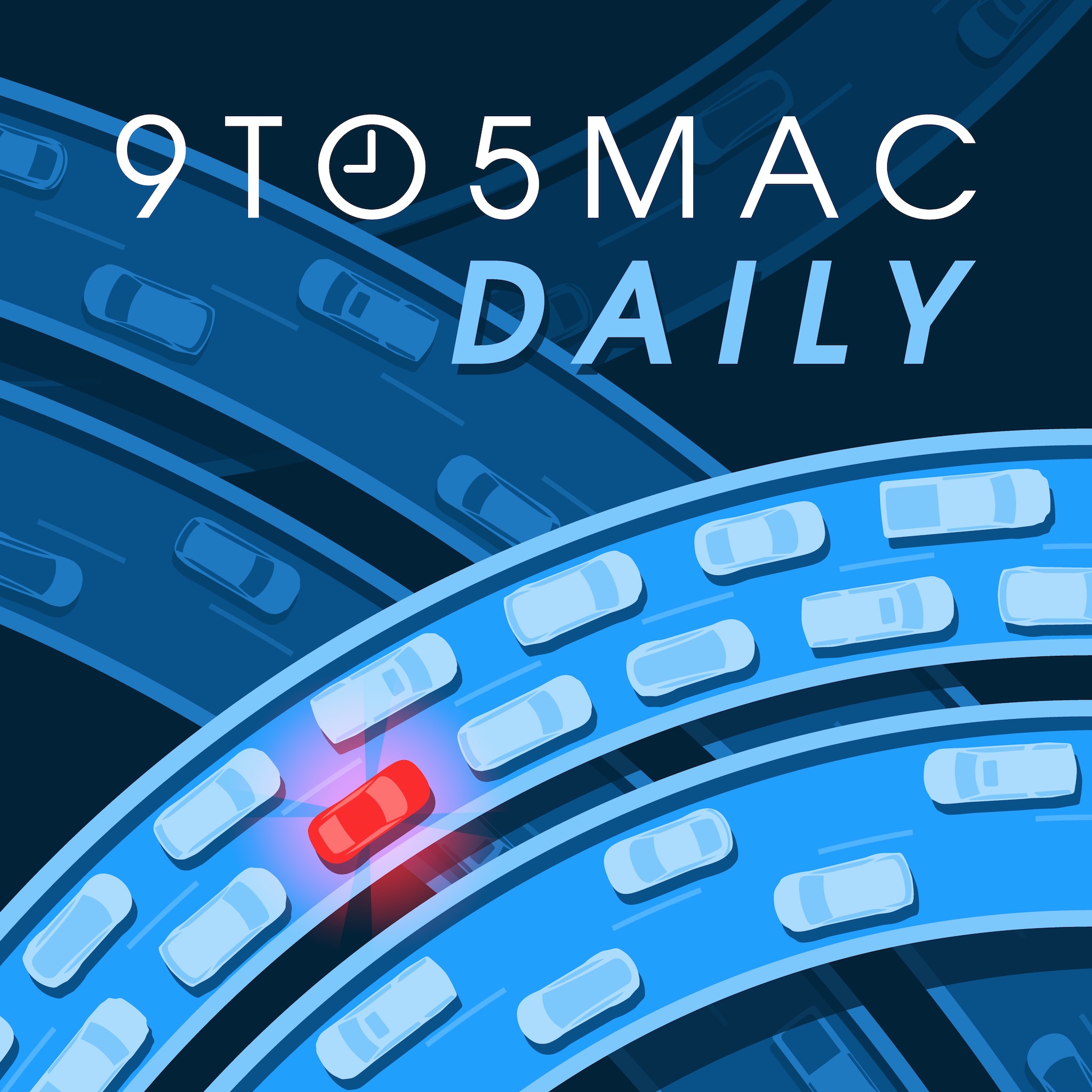
Apple officially announced its new iPhone 12 lineup this week, alongside new MagSafe charging accessories and the HomePod mini. Read on as we recap the details of everything Apple revealed during its October event as part of this week’s top stories.
HomePod mini
Apple kicked things off this week with the official announcement of the HomePod mini. Just like the rumors had predicted, this is a smaller version of the HomePod that measures in at 3.3 inches tall, making it about half as big as the full-sized HomePod.
HomePod mini includes most of HomePod’s features but a smaller spherical design that keeps the same touch-sensitive controls on the top.
In terms of audio quality, Apple says that the HomePod mini features a full range driver with dual passive radiators. Apple says that this hardware should enable deep bass and crisp high frequencies, with an immersive 360-degree audio experience.
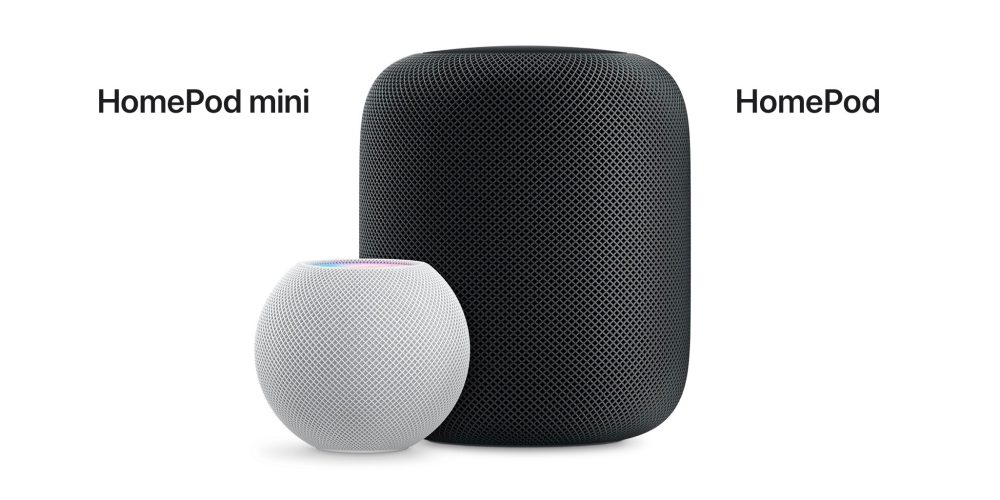
Apple is also enabling some new software features for the HomePod and HomePod mini. A new Intercom feature offers a quick and easy way for family members to connect with each other at home. Intercom also works with iPhone, iPad, Apple Watch, AirPods, and CarPlay.
You can also now set your HomePod as a permanent speaker output for the Apple TV. Once you enable this setting, your HomePod will be set up as your Apple TV’s default speaker. It’s unclear right now if this feature is available for HomePod mini, or if it’s limited to the full-sized HomePod.
Other than the difference in sound quality, the only other feature to be limited to HomePod is the spatial awareness functionality. In fact, the HomePod mini even includes the U1 ultra wideband chip for improved Handoff functionality, whereas the full-size HomePod does not.
The HomePod mini will be available to order on November 6, with availability beginning the week of November 16. It will cost $99, making it much more affordable than the $299 HomePod, which remains in Apple’s lineup without a price cut.
Read more about HomePod mini:
- Here’s how HomePod mini compares to HomePod
- Visualize the new iPhone 12 and HomePod mini using Apple’s AR renders
- Comment: What to expect from the HomePod mini
iPhone 12 and iPhone 12 mini
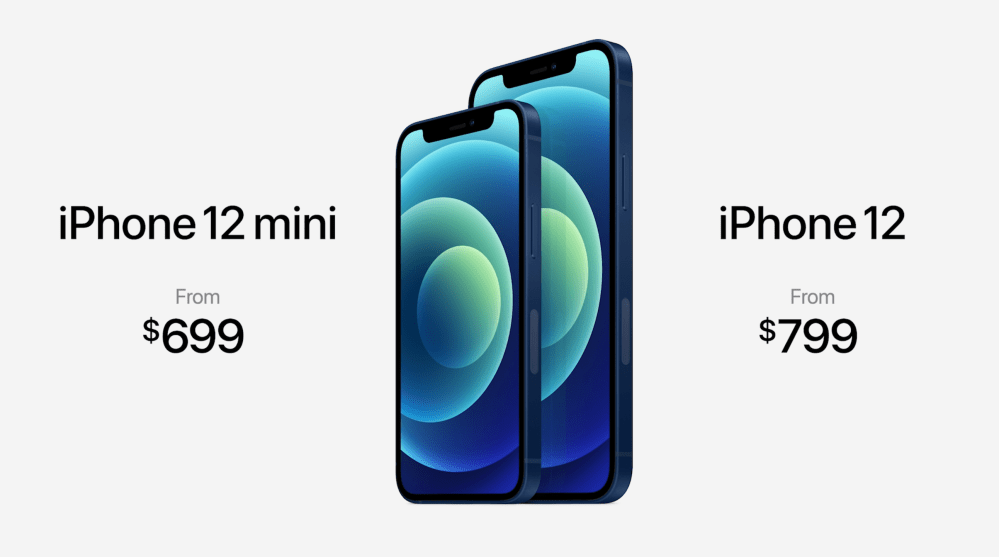
With the HomePod mini out of the way, attention shifted to the iPhone lineup and specifically the fact that the iPhone 12 is the first iPhone to feature support for 5G connectivity across the entire lineup. There is support for mmWave 5G in the United States exclusively, and support for sub-6GHz 5G in other countries as well as in the U.S.
The first iPhone 12 model officially introduced by Apple was the 6.1-inch iPhone 12. Just like the rumors suggested, the iPhone 12 features a flat-edge design similar to the iPhone 4, iPhone 5, and the newest iPad Pro hardware.
The iPhone 12 is powered by a new A14 Bionic processor that uses a new 5 nanometer process to reduce transistor size. Apple says the new six-core CPU is up to 50% faster than any other smartphone. The iPhone 12 also includes a new 4-core GPU, which is up to 50% faster than the competition.

Compared to the iPhone 11, the iPhone 12 is 11% thinner and 15% smaller in volume. Apple has adopted OLED displays across the board, improving contrast and brightness over last year’s LCD display iPhone 11 model. The display itself is a Super Retina XDR panel with a “Ceramic Shield” cover for improved durability and 4x better drop performance. The iPhone 12 features a 2532×1770 pixel resolution display at 460 pixels-per-inch.
iPhone 12 features a dual-camera setup with wide and ultra wide lenses, alongside more capable Smart HDR and improved Night mode with support for the selfie camera and the ultra wide for the first time. There is also a new Night mode Time-lapse feature on the iPhone 12.
Next up, Apple introduced the iPhone 12 mini, a smaller version of the iPhone 12 with a 5.4-inch OLED display. The iPhone 12 mini packs all of the same features as the iPhone 12, just in a smaller form factor. In fact, Apple touted during the event that the iPhone 12 mini packs a much larger screen than the 4.7-inch iPhone SE, but is actually physically smaller because of its edge-to-edge design.
The iPhone 12 mini display is 2340×1080 in terms of resolution, equating to 476 pixels-per-inch.
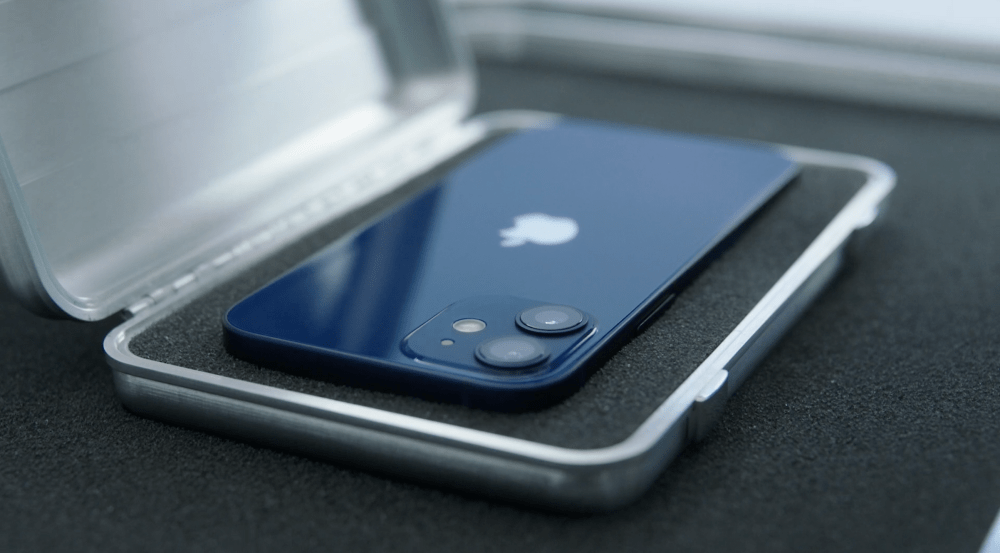
Both the iPhone 12 and iPhone 12 mini will be available in five colors: blue, green, black, white, and (PRODUCT)RED. Pricing will start at $699 for the iPhone 12 mini and $799 for the iPhone 12…if you’re buying the AT&T or Verizon versions.
Essentially, Apple has secured special deals with Sprint, T-Mobile, AT&T, and Verizon to offer the iPhone 12 mini and iPhone 12 at $699/$799. If you’re buying for any other carrier, or buying the unlocked version, you’ll pay $729 for the iPhone 12 mini and $829 for the iPhone 12. That’s a $30 price increase based on your carrier.
The base storage configuration is 64GB and you can upgrade to 128GB or 256GB.
iPhone 12 Pro
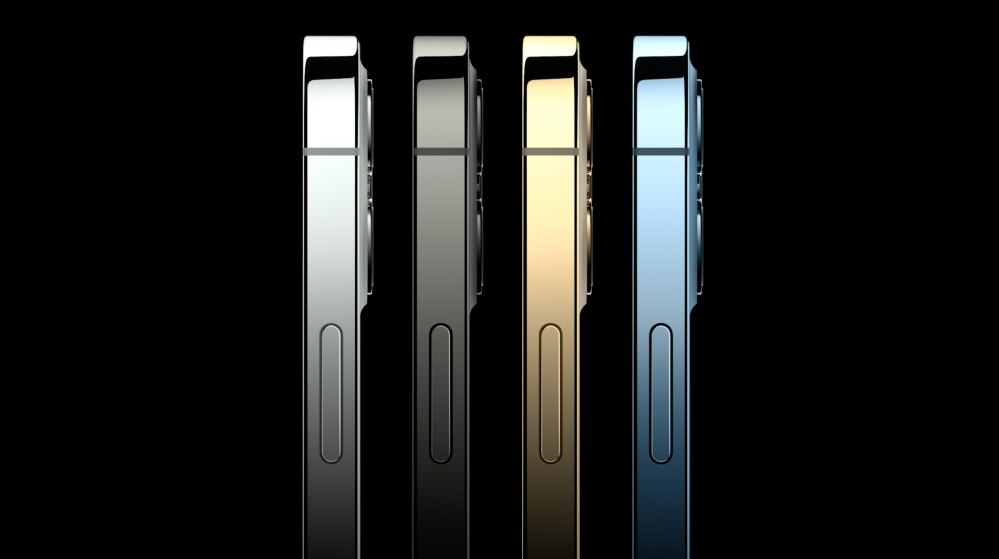
Next up, Apple shifted to the iPhone 12 Pro and the iPhone 12 Pro Max. The iPhone 12 Pro measures in at 6.1-inches, while the iPhone 12 Pro Max features a 6.7-inch screen.
Apple says the form factors of the larger iPhone 12 Pro devices are “nearly the same” than the smaller iPhone 11 Pro models they replace, even though the screen sizes have increased. The frame of the iPhone 12 Pro is made out of a durable and shiny stainless steel material available in four different finishes.
As has become the norm over the last several years, the camera hardware is what differentiates the iPhone 12 Pro from the iPhone 12. The iPhone 12 Pro features a triple-lens camera setup on the back with a telephoto lens, an ultra wide lens, and a wide lens.
Apple says that the new wide camera features the fastest ever aperture on the iPhone, for 27 percent improved low-light performance in photo and video. The ultra wide features a 120-degree field of view, which Apple says is even better for expansive landscape shots.
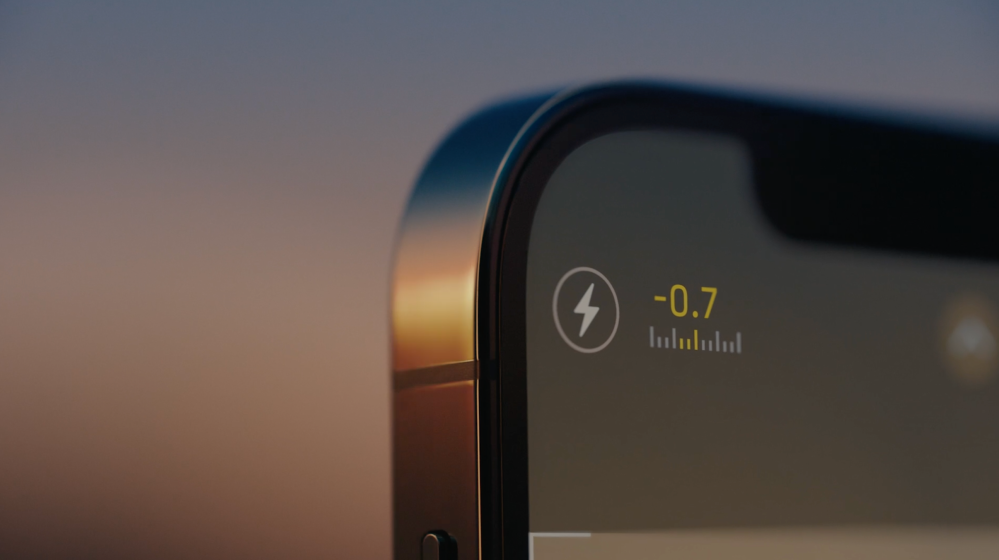
The iPhone 12 Pro Max features an even larger wide camera sensor, making for an 87 percent improvement in low-light photography. Combined, the Ultra Wide and Telephoto lens system offer 5x optical zoom range, Apple says. You also get all of the same software improvements as the iPhone 12, including Dolby Vision video recording, 10-bit HDR video recording, improved Smart HDR and Night mode, and more.
Finally, the iPhone 12 Pro and iPhone 12 Pro Max also feature an all-new LiDAR Scanner on the back. The LiDAR Scanner enables object and room scanning, AR features, and more. The LiDAR Scanner also contributes to low-light auto focus and improving capture time.
The iPhone 12 Pro and iPhone 12 Pro Max will be available in four colors, including graphite, silver, gold, and pacific blue. The iPhone 12 and iPhone 12 Pro are available to pre-order now, with availability beginning Friday, October 23. iPhone 12 Pro Max will be available for pre-order Friday, November 6 with availability beginning November 13 alongside the iPhone 12 mini.
Read more about iPhone 12 and iPhone 12 Pro:
- Apple announces iPhone 12 Pro with premium design, new pacific blue color, more
- iPhone 12 vs. iPhone 12 Pro: Which should you buy?
- GMA shows first hands-on with iPhone 12, talks about charger removal with Apple VP
- T-Mobile and Sprint match AT&T and Verizon with $799 iPhone 12 pricing
- Apple introduces new 20W USB-C power adapter, rumored braided cable nowhere to be found
- iPhone 12 Pro shipping times slip to November, select iPhone 12 models still available for day 1 delivery
- Here’s how iPhone 12 battery life compares to iPhone 11
- Apple begins offering iPhone Upgrade Program pre-approvals ahead of iPhone 12 release
- iPhone 12 models with 5G mmWave are US only, new side cutout works as antenna
- Here’s how much it costs to protect iPhone 12 and HomePod mini with AppleCare+
- As iPhone 12 arrives, Apple discontinues some older models
- Download Apple’s colorful new iPhone 12 wallpapers right here
- iPhone 12 actually costs $829, advertised $799 price includes ‘carrier special offers’
- Here are all the best iPhone trade in values after iPhone 12 launch
- PSA: Verizon customers might need to change plans to use iPhone 12 with 5G
- iPhone 12 mini has 2,227 mAh battery, new models will likely be assembled in Brazil and India
- iPhone 12 and iPhone 12 Pro now available to pre-order, first deliveries next week
MagSafe

Last but certainly not least, Apple has revived the iconic MagSafe branding for a new lineup of magnetic accessories for the iPhone 12 and iPhone 12 Pro. All four of the iPhone 12 models feature a ring of magnets on the back that allow them to use these new MagSafe accessories.
Apple has introduced its own lineup of MagSafe accessories for the iPhone 12, including a MagSafe Charger that can provide up to 15W of power to the iPhone. There’s also a MagSafe Duo charger that includes a built-in Apple Watch charger, allowing you to charge your iPhone and Apple Watch at the same time.
Apple also has a new lineup of silicone and clear cases for the iPhone 12 that take advantage of the MagSafe technology. Finally, there is even a new leather wallet that attaches magnetically to the back of your iPhone 12.
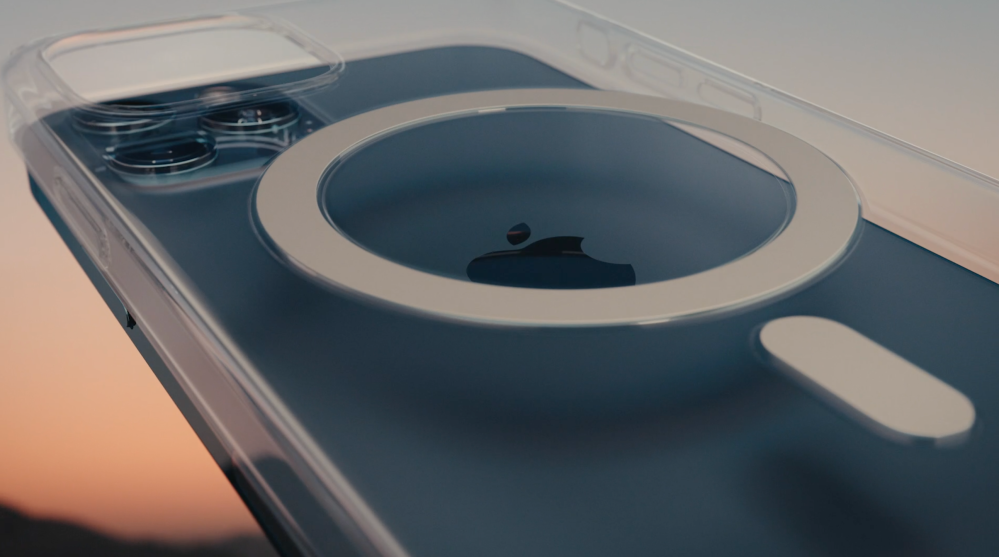
Finally, Apple says that third-party accessory makers will also be able to tap into the MagSafe ecosystem and make their own accessories that use the iPhone 12’s magnets.
The revival of the MagSafe brand for Apple’s wireless charging lineup comes after Apple canceled the AirPower project in 2019 over concerns related to reliability and overheating. Apple appears to have shifted its strategy this time around, reverting to the magnets-based approach that it used on the MagSafe chargers for the MacBook lineup for many years.
MagSafe Charger, Leather Wallet with MagSafe, and iPhone 12 Pro Silicone Case and Clear Case are available to order now. iPhone 12 Pro Leather Case will be available beginning Friday, November 6. MagSafe Duo Charger and Leather Sleeve will be available at a later date.
Read more about MagSafe:
- Apple revives MagSafe brand with new iPhone 12 wireless chargers, cases, more
- New photos and videos show MagSafe Charger and cases arriving ahead of iPhone 12
More 9to5Mac Coverage
Listen to a recap of the top stories of the day from 9to5Mac. 9to5Mac Daily is available on iTunes and Apple’s Podcasts app, Stitcher, TuneIn, Google Play, or through our dedicated RSS feed for Overcast and other podcast players.
: Trade-in your old Apple device with a guarantee now.
: Create and send great looking email newsletters with Direct Mail, an easy to use email marketing app for the Mac. Get started for free and.
Author: Chance Miller
Source: 9TO5Mac



